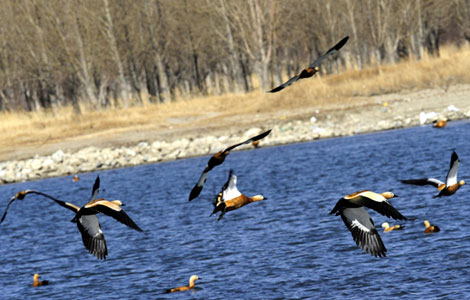Tide of progress sees water levels fall
Updated: 2012-02-02 09:41
By Shao Wei (China Daily)
|
|||||||||||
Raging sandstorms
Aibi Lake is situated in the lowest land of Junggar Basin and lies on the leeward side of Alataw Mountain Pass, where gales blow about 180 days a year. Strong gales and exposed salt marshes in the lake area make Aibi one of the four sources of sandstorms in China.


"The salt dust from the dried lake is frequently whipped up into sandstorms and will be blown to more than 5,000 km away from here," Gao said.
According to the Xinjiang Environmental Protection Bureau, some 4.8 million tons of sand are blown from the Aibi salt marshes every year. The route of National Highway 312, which runs adjacent to the lake, has been altered in places because part of the original road was buried by sand.

The Euro-Asia Continental Railway Bridge suspended operation on several occasions for the same reason. Sandstorms have brought damaging effects to northern Xinjiang and even to the middle and lower reaches of the Yellow River.
"Aibi Lake and its surrounding wetlands are the natural blockade of sandstorms for the plants, crops and people of all northern China. Its drying up will create a domino effect on people's lives and environment," ecologist Hai Ying said.
Hai proposed in the late 1990s that a nature reserve be established to protect Aibi Lake and its wetlands. The reserve was set up at the provincial level in 2000 and at State level by 2007. But the lake's dwindling means that a 1,500-sq-km water surface has been transformed into a new desert belt, Hai said.
The salt dust, which is more easily blown into the air than sand dust, has accelerated the melting of glaciers in Bortala Mongolian autonomous prefecture, Gao said. In the 1960s, he said, there were 13 sandstorm days each year on average. Now there are 110.
"We just live beside Aibi Lake," Jinghe county resident Li Hongmin said. "When the wind blows, it rains a yellow-white-colored powder. We locals always mask ourselves when going out."
The numbers of wild plants and migratory birds in the Aibi reserve also are shrinking.
"Without water into the marsh, fewer birds are coming," said Xu Wei, who works at the reserve's bird island managerial station. "I saw 15 pelicans in 2010, but more marshes turned into dry earth in 2011, and no more pelicans came."
Hot Topics
Kim Jong-il, Mengniu, train crash probe, Vaclav Havel, New Year, coast guard death, Internet security, Mekong River, Strait of Hormuz, economic work conference
Editor's Picks

|

|

|

|

|

|







